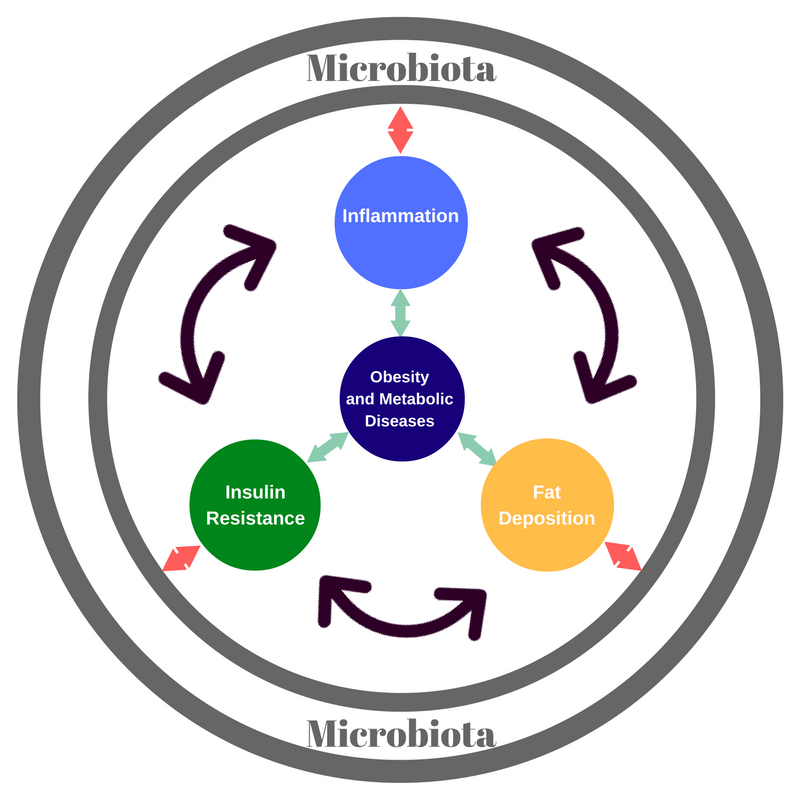The majority of inflammatory diseases originate in the gut, as the human gut harbors a range of symbiotic microorganisms which play an essential role in metabolic regulation. Any alteration in the ecosystem of these microbes paves way for abnormalities in the functioning of metabolic and immune system of the host. Molecular interactions linking the gut microbiota with host energy metabolism, lipid accumulation, and immunity have also been identified.
The figure displays the crosstalk between gut microbiota and host’s system in terms of inflammation and metabolism. The gut microbiota, through a range of molecular interactions, contribute to host insulin resistance, low-grade inflammation, and fat deposition and therefore, indirectly participate in the onset of obesity and metabolic diseases.
The gut microbiota is seen as a separate endocrine organ, which is involved, through a molecular crosstalk with the host, in the maintenance of host energy homeostasis and in the stimulation of host immunity. Shifts in gut microbial composition caused by external factors can result in a dramatic alteration of the symbiotic relationship between gut bacteria and the host, which promotes the development of metabolic diseases. In particular, the gut microbiota is believed to contribute to metabolic diseases via stimulation of inflammation.
Staphylococcus species are known to secrete ‘superantigens’ that disrupt the immune system. E.coli in the gut produce lipopolysaccharides (LPS) which enter the circulation bit by bit each day and may lead to accumulation if the liver doesn’t work to clear the LPS off. This LPS detoxification pathway is, however, shut down by the superantigens produced by Staph bacteria, which bind to this ‘uncleared’ LPS and release cytokines causing inflammation.
Chronic inflammation of the gut can disrupt the normal functioning of many bodily systems. A wide array of health problems, including but not limited to obesity, insulin resistance, type 2 diabetes, periodontal disease, stroke, and heart disease all have inflammation as a part of the disease. The deadly effects of superantigens produced as a consequence of various staph infections can be toxic shock syndrome, sepsis, and endocarditis.
Consuming a high-fat diet triggers an increase in chylomicrons which lead to an increased gut permeability, favoring infiltration of LPS into the circulation. These raised systemic levels of bacterial LPS cause a condition known as metabolic endotoxemia.
Obese people have greater colonization of pathogenic bacteria in comparison to lean people who have more beneficial bacteria in their intestines. Adipocytes or fat cells interact with bacterial toxins and release cytokines which trigger a chronic inflammatory process.
Type 2 diabetic patients suffer from impaired lipoprotein metabolism which reduces LPS catabolism and might increase endotoxemia-related inflammation.
High population of bifidobacteria and low concentration of Staph aureus prevent excessive weight gain in infants. Probably, that’s the reason why breastfed babies have lower risk of obesity.
Also, poor oral hygiene accounts for 70% increased risk of heart disease in people. Taking care of gums and improving dental care slows down the speed of plaque build-up in the arteries (atherosclerosis). Periodontal disease involves both bone as well as the tissue attached to it. The tissue which is the point of contact acts as a gateway for bacteria and toxic inflammatory compounds to enter the bloodstream. Once in the bloodstream, these toxic compounds can harm the lining of blood vessels, which can lead to both strokes and heart attacks.
Squeezing Stomachs To Get Rid Of Obesity: An Account On Gastric Restriction
The epidemic of morbid obesity has paved way for a renewed interest in its surgical treatment. Bariatric surgery, proved to be associated with a significantly reduced number of cardiovascular deaths and a lower incidence of cardiovascular events in obese adults, Read More..









